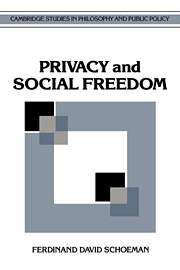Book contents
- Frontmatter
- Contents
- Acknowledgments
- Introduction
- 1 The meaning and scope of privacy
- 2 Mill's approach to social freedom
- 3 Articulated rationality and the Archimedean critique of culture
- 4 Social freedom from the perspective of cognitive and social psychology
- 5 The importance of cultural authority for morality
- 6 Explaining privacy's place
- 7 The ascent of privacy: a historical and conceptual account
- 8 Privacy and gossip
- 9 Privacy and spheres of life
- 10 Spheres of life: a literary exploration
- Epilogue
- Notes
- Index
5 - The importance of cultural authority for morality
Published online by Cambridge University Press: 23 October 2009
- Frontmatter
- Contents
- Acknowledgments
- Introduction
- 1 The meaning and scope of privacy
- 2 Mill's approach to social freedom
- 3 Articulated rationality and the Archimedean critique of culture
- 4 Social freedom from the perspective of cognitive and social psychology
- 5 The importance of cultural authority for morality
- 6 Explaining privacy's place
- 7 The ascent of privacy: a historical and conceptual account
- 8 Privacy and gossip
- 9 Privacy and spheres of life
- 10 Spheres of life: a literary exploration
- Epilogue
- Notes
- Index
Summary
A cultureless human being would probably turn out to be not an intrinsically talented though unfulfilled ape, but a wholly mindless and consequently unworkable monstrosity Like the cabbage it so much resembles, the Homo sapiens brain, having arisen within the framework of human culture, would not be viable outside of it.
(Clifford Geertz, Interpretations of Culture)In Chapter 4, our focus was on disparities between moral judgmental practice and widespread beliefs about what influences moral judgment. The burden of this chapter is to suggest the relevance of some of these findings to our conception of morality. In emphasizing conforming tendencies as corrective and salutary, as I do in this chapter, I do not mean to be seen as arguing that either cultures generally or those around one in particular are all one needs for a morally informed life. Rather, I want to highlight the morally constructive dimensions of socialization and conforming tendencies. In so doing, I hope to counteract the tendency in philosophy to regard these tendencies as slavish and corrupting. Conformity uncompromised is mindless. But autonomy uncompromised is sociopathic.
What makes autonomy uncompromised sociopathic is its refusal to accept any authority but that of the agent's own judgment. We saw that much of moral philosophy applauds the effort to undermine the authority of culture, traditions, associations, and institutions, relegating to the individual the role of validating whatever is to be accepted, without primary or basic reliance on any of these sources.
- Type
- Chapter
- Information
- Privacy and Social Freedom , pp. 66 - 88Publisher: Cambridge University PressPrint publication year: 1992



